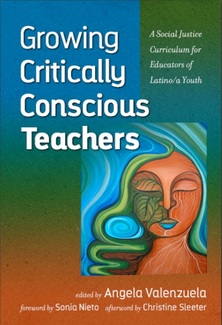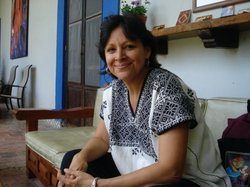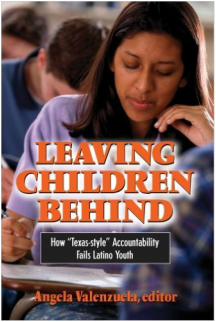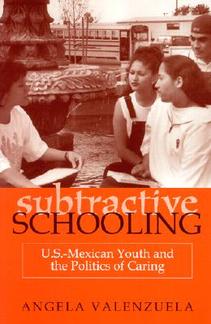|
Author of award-winning book, Subtractive Schooling: U.S. Mexican Youth and the Politics of Caring and Leaving Children Behind: How “Texas-style” Accountability Fails Latino Youth, Dr. Angela Valenzuela has a volume that is in press titled, Growing Critically Conscious Teachers: A Social Justice Curriculum for Educators of Latino/a Youth (New York: Teachers College Press). This latest book represents the culmination of years of work in developing a Grow Your Own - Teacher Education Institutes initiative, a key effort of the National Latino/a Education Research and Policy Project that she directs.
|
Growing Critically Conscious Teachers: A Social Justice Curriculum for Educators of Latino/a Youth
Growing Critically Conscious Teachers: A Social Justice Curriculum for Educators of Latino/a Youth represents our work and thinking within the National Latino Education Research and Policy Project. Many thanks to the gifted Latina artist, Tanya Torres, for her permission for me to use "Cacibayagua," this symbol of a Taino goddess, as the cover for this book. It represents well what this volume conveys, namely, that growing critically conscious teachers isn't simply about creating pathways for them into the teaching profession, but also about growing consciousness—or concienticazión, as expressed by the late Paolo Freire
Here are artist Tania Torres' words about "La Cacibayagua." Cacibayagua by Tanya Torres "From Cacibayagua came the majority of the people who settled the island." Fray Ramón Pané I thought the cave Cacibayagua, from which the Taínos are said to have come, might be a place of earth and river water from whose veins flows life. Cacibayagua is earth, and she is also water. Like the Black Virgin, she is the color of the Earth. Water, cave, virgin goddess, like the ancient Goddess, mother of all. The Relación of Fray Ramon Pane See Table of Contents here. |
|


